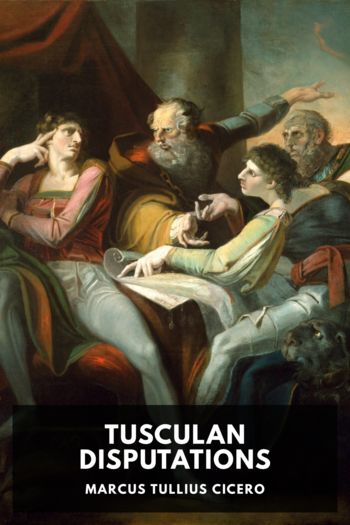Tusculan Disputations - Cicero (red novels TXT) 📗

- Author: Cicero
Book online «Tusculan Disputations - Cicero (red novels TXT) 📗». Author Cicero
By Marcus Tullius Cicero.
Table of Contents Titlepage Imprint Introduction Tusculan Disputations Book I: On the Contempt of Death Book II: On Bearing Pain Book III: On Grief of Mind Book IV: On Other Perturbations of the Mind Book V: Whether Virtue Alone Be Sufficient for a Happy Life Endnotes Colophon Uncopyright ImprintThis ebook is the product of many hours of hard work by volunteers for Standard Ebooks, and builds on the hard work of other literature lovers made possible by the public domain.
This particular ebook is based on a transcription produced for Project Gutenberg and on digital scans available at Google Books.
The writing and artwork within are believed to be in the U.S. public domain, and Standard Ebooks releases this ebook edition under the terms in the CC0 1.0 Universal Public Domain Dedication. For full license information, see the Uncopyright at the end of this ebook.
Standard Ebooks is a volunteer-driven project that produces ebook editions of public domain literature using modern typography, technology, and editorial standards, and distributes them free of cost. You can download this and other ebooks carefully produced for true book lovers at standardebooks.org.
IntroductionIn the year AUC 708, and the sixty-second year of Cicero’s age, his daughter, Tullia, died in childbed, and her loss afflicted Cicero to such a degree that he abandoned all public business, and, leaving the city, retired to Asterra, which was a country house that he had near Antium, where, after a while, he devoted himself to philosophical studies, and, besides other works, he published his Treatise de Finibus, and also this treatise called the Tusculan Disputations, of which Middleton gives this concise description:
The first book teaches us how to contemn the terrors of death, and to look upon it as a blessing rather than an evil;
The second, to support pain and affliction with a manly fortitude;
The third, to appease all our complaints and uneasinesses under the accidents of life;
The fourth, to moderate all our other passions;
And the fifth explains the sufficiency of virtue to make men happy.
It was his custom in the opportunities of his leisure to take some friends with him into the country, where, instead of amusing themselves with idle sports or feasts, their diversions were wholly speculative, tending to improve the mind and enlarge the understanding. In this manner he now spent five days at his Tusculan villa in discussing with his friends the several questions just mentioned. For, after employing the mornings in declaiming and rhetorical exercises, they used to retire in the afternoon into a gallery, called the Academy, which he had built for the purpose of philosophical conferences, where, after the manner of the Greeks, he held a school, as they called it, and invited the company to call for any subject that they desired to hear explained, which being proposed accordingly by some of the audience became immediately the argument of that day’s debate. These five conferences, or dialogues, he collected afterward into writing in the very words and manner in which they really passed, and published them under the title of his Tusculan Disputations, from the name of the villa in which they were held.
Tusculan Disputations Book I On the Contempt of DeathAt a time when I had entirely, or to a great degree, released myself from my labors as an advocate, and from my duties as a senator, I had recourse again, Brutus, principally by your advice, to those studies which never had been out of my mind, although neglected at times, and which after a long interval I resumed. And now, since the principles and rules of all arts which relate to living well depend on the study of wisdom, which is called philosophy, I have thought it an employment worthy of me to illustrate them in the Latin tongue, not because philosophy could not be understood in the Greek language, or by the teaching of Greek masters; but it has always been my opinion that our countrymen have, in some instances, made wiser discoveries than the Greeks, with reference to those subjects which they have considered worthy of devoting their attention to, and in others have improved upon their discoveries, so that in one way or other we surpass them on every point; for, with regard to the manners and habits of private life, and family and domestic affairs, we certainly manage them with more elegance, and better than they did; and as to our republic, that our ancestors have, beyond all dispute, formed on better customs and laws. What shall I say of our military affairs, in which our ancestors have been most eminent in valor, and still more so in discipline? As to those things which are attained not by study, but nature, neither Greece, nor any nation, is comparable to us; for what people has displayed such gravity, such steadiness, such greatness of soul, probity, faith—such distinguished virtue of every kind, as to be equal to our ancestors. In learning, indeed, and all kinds of literature, Greece did excel us, and it was easy to do so where there was no competition; for while among the Greeks the poets were the most ancient species of learned men—since Homer and Hesiod lived before the foundation of Rome, and Archilochus1 was a contemporary of Romulus—we received poetry much later. For it was about five hundred and ten years after the building of Rome before Livius2 published a play in the consulship of C. Claudius, the son of Caecus, and M. Tuditanus, a year before the birth of Ennius, who was older than Plautus and Naevius.
It was, therefore, late before poets were either known or received





Comments (0)